
Politics in North Macedonia occur within the framework of a parliamentary representative democratic republic, whereby the Prime Minister is the head of government, and of a multi-party system. Executive power is exercised by the government. Legislative power is vested in both the government and parliament. The Judiciary is independent of the executive and the legislature. The Economist Intelligence Unit rated North Macedonia a "flawed democracy" in 2022.

The Internal Macedonian Revolutionary Organization – Democratic Party for Macedonian National Unity, often simplified as VMRO-DPMNE, is a political party in North Macedonia and one of the two major parties in the country, the other being the Social Democratic Union of Macedonia.
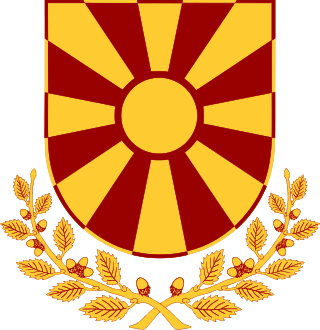
The President of the Republic of North Macedonia is the head of state of North Macedonia.

North Macedonia elects on the national level a head of state—the president—and a legislature. The president is elected for a five-year term by the people. The Assembly of the Republic of North Macedonia (Sobranie) has 120-123 members, elected for a four-year term, by proportional representation. North Macedonia has a multi-party system, with numerous parties in which no one party often has a chance of gaining power alone, and parties must work with each other to form coalition governments.

An autonomy referendum was held in Macedonia on 7 November 2004. Voters were asked whether they approved of overturning the municipal redistricting plans that gave greater autonomy to ethnic Albanians following the Ohrid Agreement that ended the 2001 conflict between ethnic Albanian militants and the predominantly ethnic Macedonian government forces. These had been changed to give ethnic Albanians greater control in districts where they had significant presence and gives local authorities greater control over education, health and development. It also reduced the number of municipalities from 123 to 84.
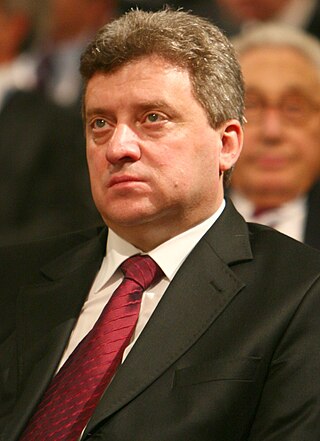
Presidential elections were held in Macedonia in 2009. The first round was held on 22 March, alongside local elections. As no candidate received more than 50% of the vote, a run-off round was held on 5 April 2009, which was won by Gjorge Ivanov of the center-right VMRO-DPMNE party. Incumbent President Branko Crvenkovski did not stand for re-election.

Gjorge Ivanov is a Macedonian politician, who served as the 4th President of North Macedonia from 2009 to 2019.
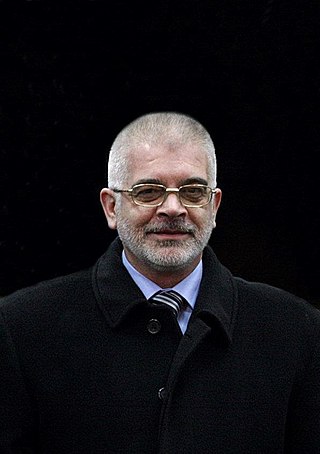
Todor Petrov is the president of the Macedonian diaspora organisation World Macedonian Congress (WMC). Petrov is a councillor in the electorate of Gazi Baba.
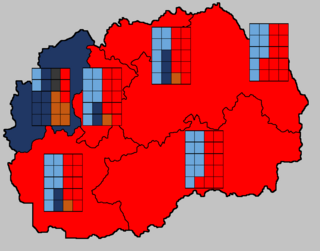
Early parliamentary elections were held in the Republic of Macedonia on 5 June 2011, a year earlier than necessary. All 123 parliamentary seats of the Sobranie were due for election, including the 3 seats provided for the first time for representatives of the Macedonian citizens living abroad: 1 from Europe, 1 from North America, and 1 from Asia and Australia. The decision of the ruling parties, the Christian Democratic VMRO-DPMNE and the ethnic Albanian Democratic Union for Integration (DUI), to dissolve the Parliament and call for an early election was preceded by protests of the Social Democratic Union (SDSM), the major opposition party, and subsequent boycott of the Parliament by them, and by other smaller opposition parties.
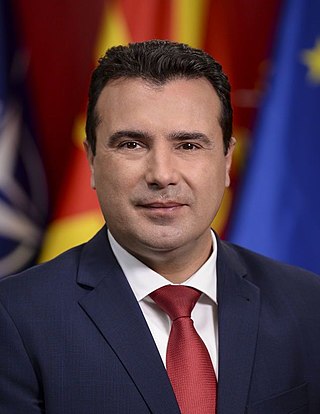
Zoran Zaev is a Macedonian economist and politician who served as prime minister of North Macedonia from May 2017 to January 2020, and again from August 2020 to January 2022.

General elections were held in the Republic of Macedonia in April 2014 to elect the President and members of parliament. The first round of the presidential elections were held on 13 April, with incumbent president Gjorge Ivanov finishing first with 53% of the vote. However, as he did not receive the support of 50% of all registered voters, a second round was held on 27 April, alongside parliamentary elections, with Ivanov and the ruling coalition led by VMRO-DPMNE claiming victory as Ivanov was elected president and the VMRO-DPMNE won 61 of the 123 seats in the Assembly.
The following lists events that happened during 2014 in the Republic of Macedonia.

Early parliamentary elections were held in Macedonia on 11 December 2016, having originally been planned for 24 April and later 5 June.
Storming of the Macedonian Parliament, also known as Bloody Thursday occurred on 27 April 2017, when about 200 Macedonian nationalists stormed the Macedonian Parliament in reaction to the election of Talat Xhaferi, an ethnic Albanian, as Speaker of the Assembly of the Republic of Macedonia. It was the biggest attack in history on a Macedonian institution.
The Alliance for the Albanians is a centre-right political party founded in 2015 in North Macedonia by Ziadin Sela.

The Prespa Agreement, also known as the Treaty of Prespa, the Prespes deal or the Prespa accord, is an agreement reached in 2018 between Greece and the then-Republic of Macedonia, under the auspices of the United Nations, resolving a long-standing dispute between the two countries. Apart from resolving the terminological differences, the agreement also covers areas of cooperation between the two countries in order to establish a strategic partnership.

A referendum was held in the Republic of Macedonia on 30 September 2018, with voters asked whether they supported EU and NATO membership by accepting the Prespa Agreement between Macedonia and Greece, signed in June 2018, which aimed to settle the 27-year naming dispute, which had prevented Macedonia from joining both the European Union and NATO. Despite 94% of voters voting in favour, voter turnout was around 37%, less than the 50% threshold required to validate the results.

Gordana Siljanovska-Davkova is a Macedonian university professor and lawyer. She was a candidate for the 2019 presidential elections of North Macedonia.

Early parliamentary elections were held in North Macedonia on 15 July 2020. It was originally scheduled for November 2020, but Prime Minister Zoran Zaev called early elections after the European Council failed to come to an agreement on starting talks with North Macedonia on joining the European Union in October 2019. The election date was set for 12 April, but was postponed until July due to the COVID-19 pandemic in North Macedonia.

Presidential elections were held in North Macedonia on 24 April 2024. No candidate received a majority of votes in the first round, so a second round will be held on 8 May 2024, alongside parliamentary elections. Incumbent Stevo Pendarovski is eligible for re-election.
















